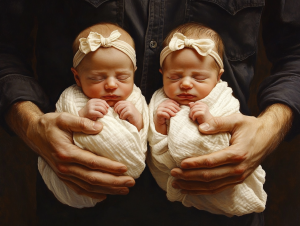I was filled with joy as I drove to the hospital to bring home my wife, Suzie, and our newborn twins. Balloons floated in the passenger seat, and I couldn’t wait for Suzie to see the nursery, the meal I had cooked, and everything I had prepared for her. After nine long months, she deserved happiness.
But when I walked into her hospital room, my heart dropped. The bassinets were there, the twins fast asleep—but Suzie was gone. I thought she had stepped out until I found a note.
“Goodbye. Look after them. Find out why your mother did this to me.”

I was stunned. What did she mean? Why would she leave now, just when we had everything we wanted?
A nurse entered the room and confirmed that Suzie had left earlier that morning. No one had stopped her; no one had suspected anything. In a daze, I took my daughters home.
My mother, Mandy, was waiting with a big smile and a casserole. But I couldn’t even look at her. I handed her the note.
Her expression changed instantly. She denied knowing anything, but I didn’t believe her. I remembered all the passive-aggressive comments she had made to Suzie during the pregnancy—how she always doubted her, criticized her, diminished her.
That night, while the twins slept, I found a letter hidden in Suzie’s jewelry box. It was from my mother:
“My son will never be happy with you. You’ve trapped him with this pregnancy. If you love them, walk away before you ruin their lives.”
Rage and guilt twisted in my gut. This—this was why she left. I confronted my mother and made her leave my house. She begged and cried, but I was done. Suzie had been driven away by the one person who should have supported us.
The weeks that followed were brutal. Sleepless nights, diapers, crying fits—mine and the babies’. I searched for Suzie, contacted her friends, and tried to understand how I’d missed the signs.
One friend, Sara, admitted Suzie had felt trapped and broken by Mandy’s words. I realized how isolated she must have felt.
Then, months later, a photo arrived from an unknown number: Suzie in the hospital, holding the twins. A message followed: “I want to be the kind of mother they deserve. I hope you’ll forgive me.”
But the number never responded. For a year, I held onto that image, raising Callie and Jessica alone, never losing hope.

Then, on their first birthday, someone knocked on the door.
It was Suzie.
Tears filled her eyes as she whispered, “I’m sorry.”
I didn’t hesitate. I embraced her, and for the first time in a year, I felt whole again.
In the weeks that followed, Suzie opened up about the depression, the pain, and her need to heal. Therapy helped her reclaim herself. Together, we rebuilt what had nearly been lost.
“I didn’t want to leave,” she said. “But I didn’t know how to stay.”
“I’m glad you found your way back,” I whispered. “We’ll figure it out—together.”
And we did.

